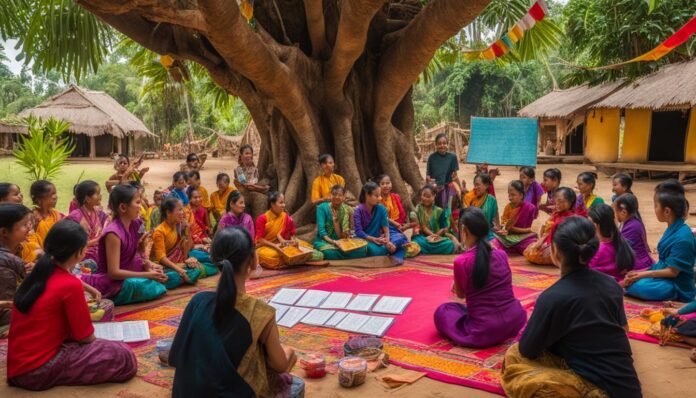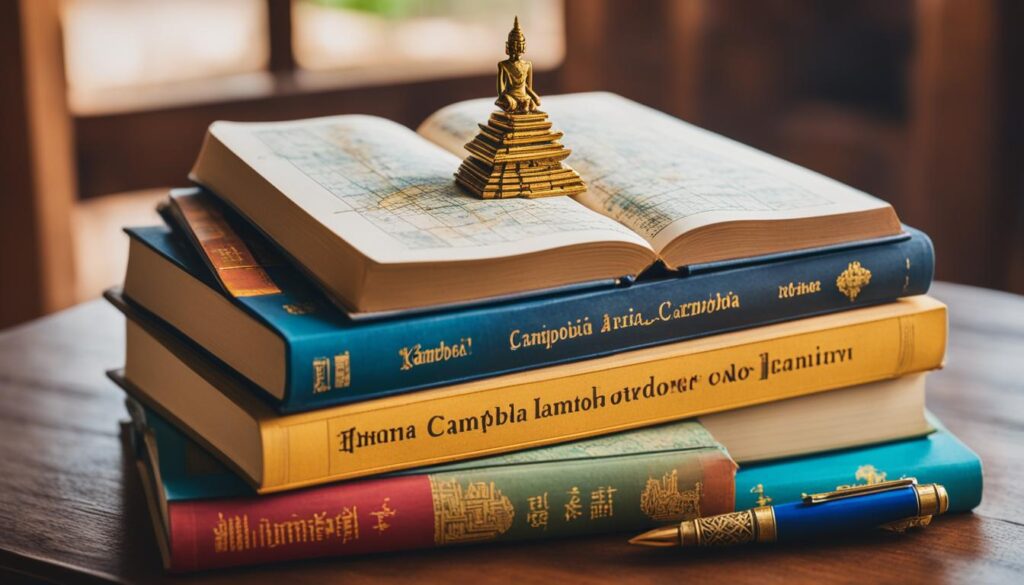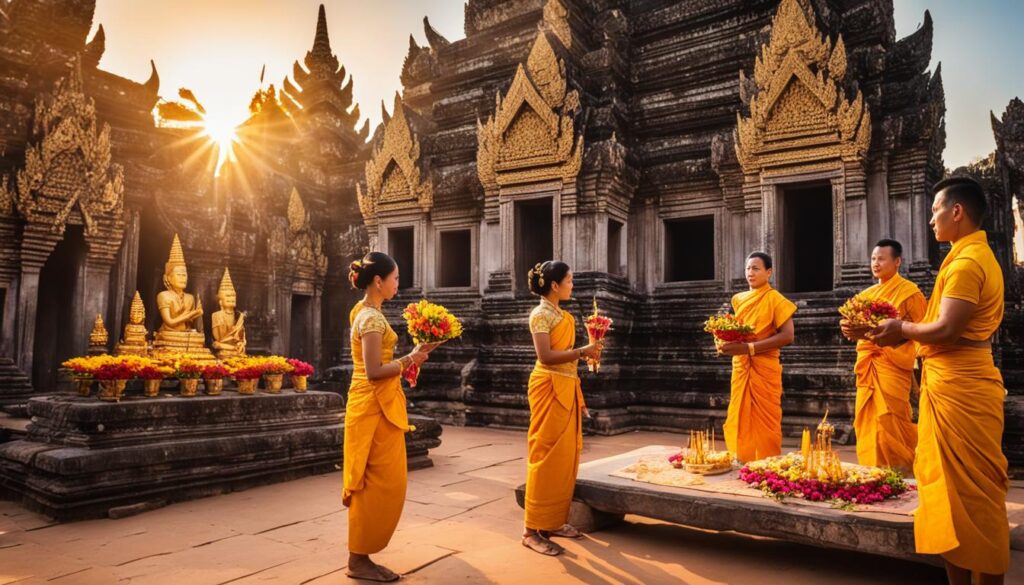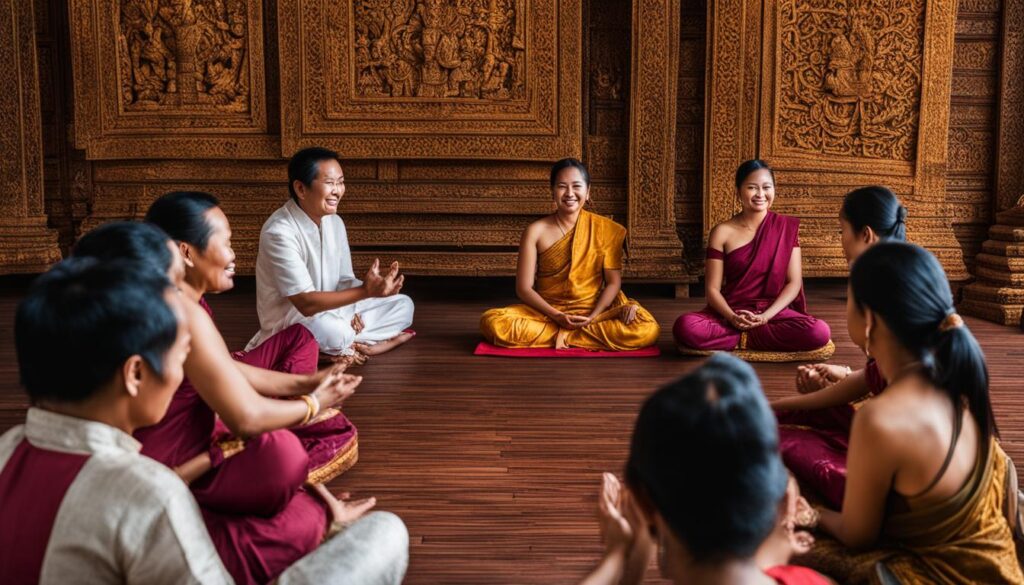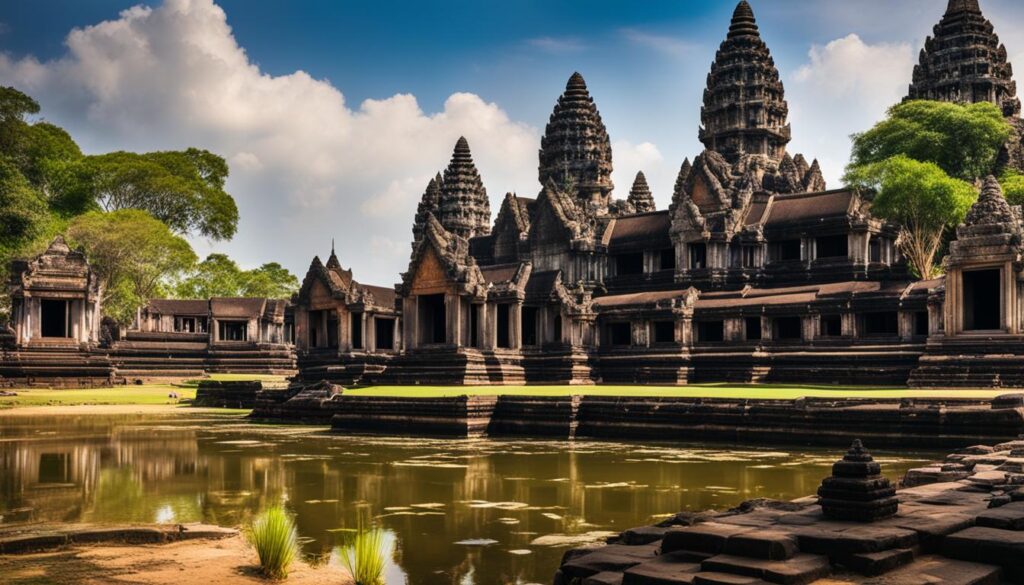Are you planning a trip to Cambodia? Learning Khmer language basics and cultural customs can greatly enhance your travel experience. Not only will you be able to communicate with locals more effectively, but you will also gain a deeper appreciation for their rich culture and customs.
At times it may seem overwhelming, but don’t be intimidated! With the right resources and dedication, you can master the fundamental elements of this beautiful language and culture effortlessly. And we are here to help you do just that.
In this article, we’ll guide you through the basics of the Khmer language, explore the cultural customs of Cambodia, and provide tips on how to immerse yourself in Khmer culture beyond just learning the language.
By the end of this article, you will have gained valuable insights into Khmer language basics, cultural customs, and have resources for continued learning to further enhance your travel experience. So, let’s dive in!
Why Learn Khmer Language Basics?
Learning the basics of the Khmer language can be a rewarding experience that opens up a world of opportunities. From communicating with locals to gaining a deeper understanding and appreciation of the culture, there are many benefits to mastering Khmer language basics. Here are a few examples:
- Access to valuable resources: By learning Khmer language basics, you’ll be able to access a wide range of resources that are not available in English. This includes books, newspapers, and online content that can provide you with a deeper understanding of Cambodian culture and society.
- Improved travel experience: Speaking Khmer can greatly enhance your travel experience in Cambodia. It can help you navigate your way around the country, interact with locals, and gain a deeper appreciation of the culture and customs.
- Professional benefits: Knowing Khmer language basics can also be beneficial for professionals who work in Cambodia, particularly in fields such as tourism, education, and business.
Whether you’re interested in taking Khmer language classes or using a Khmer language guide, there are many resources available to help you get started. By mastering essential Khmer language phrases and understanding pronunciation, you’ll be on your way to developing valuable language skills that will enrich your life in so many ways.
Khmer Language Learning Resources
If you’re interested in learning Khmer language basics, here are some helpful resources to consider:
| Resource | Description |
|---|---|
| Khmer language classes | Joining a Khmer language class can provide you with structured learning and opportunities to practice with other learners. |
| Online courses | There are many online courses available that cater to different levels of Khmer language proficiency, from beginner to advanced. |
| Language exchange programs | Participating in a language exchange program can help you practice your Khmer with locals and make new friends. |
| Khmer language apps | There are several Khmer language learning apps available for smartphones and tablets that can help you learn on the go. |
| Khmer language guidebooks | Guidebooks can provide you with essential Khmer language phrases and help you navigate your way around the country. |
With so many Khmer language learning resources available, there’s never been a better time to start your journey towards mastering this beautiful language.
The Importance of Cultural Customs in Cambodia
When traveling to Cambodia, understanding the Khmer language culture and Khmer cultural customs is essential to fully appreciate the local way of life. Cambodian people are proud of their rich culture and traditions, so showing respect and appreciation can go a long way in building meaningful connections.
One important aspect of Khmer cultural customs is the practice of greeting each other with a sampeah, a gesture where the palms are pressed together in front of the chest with a slight bow. This is commonly used when meeting someone for the first time, as a sign of respect and politeness.
Another significant Khmer cultural custom is the importance of family and community. In Cambodia, families often live together and there is a strong sense of community and values centered around respect for elders and authority figures.
When visiting Cambodia, it’s also important to dress modestly and avoid showing too much skin, especially when visiting temples or other religious sites. Taking off your shoes before entering someone’s home or a place of worship is also a sign of respect.
By familiarizing yourself with Khmer cultural customs, you can navigate social situations with ease and show respect for the local culture. To further enhance your understanding of the Khmer way of life, consider participating in local activities and events, such as traditional dance performances or cooking classes.
Basic Khmer Language Essentials
If you’re a beginner in learning Khmer language basics, it’s essential to start with the basics. Here are the most important elements:
The Khmer Alphabet
The Khmer alphabet consists of 33 consonants and 24 vowels. It’s vital to learn the Khmer script and pronunciation to get a solid foundation.
Basic Grammar
Khmer grammar is relatively straightforward, but it’s essential to learn the basics. For example, in Khmer grammar, adjectives follow the noun, and there are no articles.
Common Greetings and Expressions
Learning common Khmer greetings and expressions can help you engage with locals and show respect for the culture. Some useful phrases include “Sous-dey” (Hello), “Aw kohn” (Thank you), and “Som touk jol nak” (Happy Water Festival).
Tip: Learning the Khmer language requires repetition and practice. Don’t be afraid to make mistakes and keep practicing until you feel comfortable.
Immersing Yourself in the Khmer Language
If you are serious about learning the Khmer language, there are various ways you can immerse yourself in it. As a beginner, you can start with online courses specifically designed for Khmer language learners. These courses provide a structured approach to learning grammar, vocabulary, and pronunciation, and typically offer interactive tools to help you practice what you have learned.
Another option is language exchange programs, which match you with a Khmer language speaker who wants to learn your native language, giving you the opportunity to practice with a native speaker and learn more about their culture.
Supplement your studies with Khmer language learning resources, such as textbooks, phrasebooks, and audio guides, which can help you improve your comprehension and communication skills. Many resources are available for download or purchase online, making it easy to access them from anywhere.
Whatever method you choose, remember that regular practice is essential for success in learning Khmer. Consistency is key, so make an effort to engage with the language every day.
Pros and Cons of Immersing Yourself in the Khmer Language
| Pros | Cons |
|---|---|
| Gain a deeper understanding of Khmer culture | Time-consuming and requires commitment |
| Improved pronunciation and language skills | May be difficult to find language exchange partners |
| Access to a wide variety of learning resources | Online courses may not be as interactive as in-person classes |
| Opportunities for cultural exchange and meaningful connections | Language learning can be frustrating at times |
Overall, immersing yourself in the Khmer language can be a transformative experience, allowing you to gain a greater appreciation for Cambodia’s rich history and culture while improving your language skills. Consider the pros and cons of each method and choose the approach that aligns with your goals and learning style.
Understanding Khmer Cultural Etiquette
When traveling to Cambodia, it’s important to understand and respect the Khmer cultural customs to have a more enriching and meaningful experience. The Khmer culture has a strong emphasis on respect for others, and knowing the appropriate greetings, gestures, and customs can demonstrate your appreciation for their way of life.
One of the most important aspects of Khmer cultural etiquette is greeting others. In Cambodia, bowing or raising your hands in a prayer-like gesture, known as sompiah, is the traditional way of greeting others. It’s also customary to address people using their titles and proper honorifics, such as Nyai for grandmothers and Lok for older brothers.
Another important custom is dining etiquette. In Khmer culture, it’s customary to share dishes with others rather than ordering individual portions. Use your right hand to pick up food and eat with care and attention, as sloppiness is viewed as disrespectful. Refrain from wasting food as a sign of courtesy to the host and other guests.
When visiting temples or pagodas, taking off your shoes and hat before entering is a sign of respect. Be mindful of your actions and dress modestly to show reverence for the religious site.
By understanding and respecting Khmer language culture and customs, you can build meaningful connections with locals and show your appreciation for their traditions. Take the time to learn these customs and practice them during your travels in Cambodia for a more authentic and memorable experience.
Exploring Khmer Traditions and Festivals
Khmer culture is rich in tradition and festivals that showcase the country’s vibrant heritage. By immersing yourself in these celebrations, you can gain deeper insights into the Khmer cultural customs.
One of the most significant festivals is the Khmer New Year, which takes place in mid-April and lasts for three days. During this time, locals wear new clothes and splash water on each other to cleanse themselves of the past year’s negativity.
Another popular festival is the Water Festival, also known as Bon Om Touk. This three-day event takes place in November and celebrates the end of the rainy season. Locals flock to the riverfront to watch traditional boat races and fireworks.
Other festivals to look out for include:
- The Royal Ploughing Ceremony – a ritual held in May to determine the upcoming harvest season
- Angkor Wat International Half Marathon – a popular race that takes place in Siem Reap in August
- Chinese New Year – celebrated by the country’s Chinese population in February
Attending these festivals is the perfect way to experience Khmer cultural customs first-hand. Make sure to interact with locals, try traditional foods, and take part in the festivities!
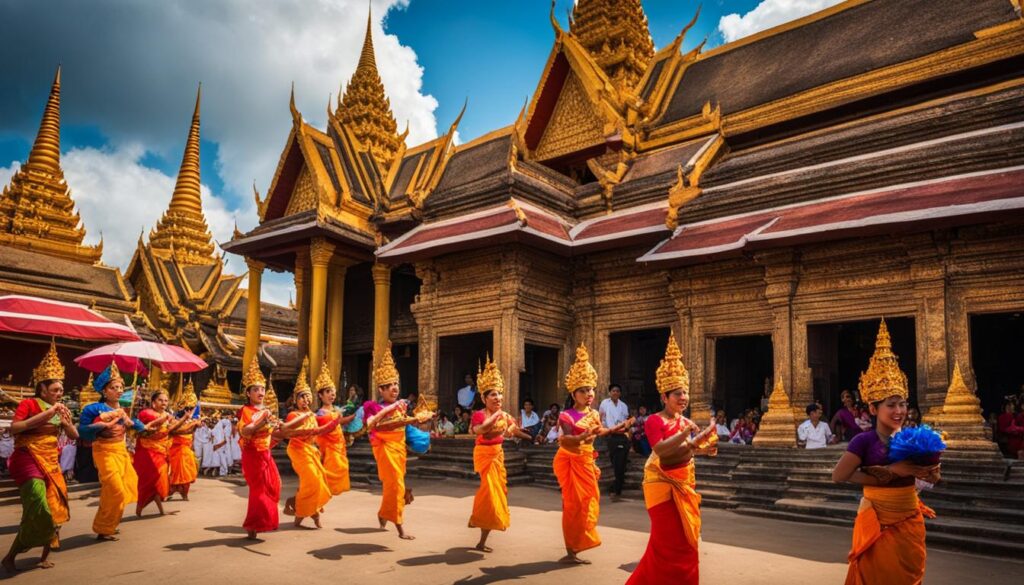
Navigating Khmer Language Challenges
Learning a new language comes with challenges, and Khmer is no exception. As a beginner, you may find pronunciation and understanding of local accents to be the most significant hurdles. However, with the right tips and strategies, you can overcome these obstacles and continue progressing in your language journey.
Tips for Improving Khmer Language Pronunciation:
- Listen and repeat – Practice speaking Khmer aloud, mimicking the pronunciation of native speakers and repeating difficult words.
- Start slowly – Focus on mastering one sound at a time before moving on to more challenging ones.
- Utilize online resources – Online learning resources such as YouTube videos and language learning apps can provide audio examples of Khmer pronunciation.
Strategies for Understanding Local Accents:
- Immerse yourself in the language – Spend time listening to and interacting with native speakers to become more familiar with the local accent.
- Work with a tutor – A Khmer language tutor can provide individualized instruction and help you understand and adjust to local accents.
- Watch local news broadcasts and TV shows – These can expose you to the nuances of the local accent and provide an opportunity to practice comprehension.
Remember that perfecting pronunciation and understanding local accents takes time and practice. Be patient with yourself and continue to seek out resources and opportunities to improve your language skills. With dedication and effort, you can overcome Khmer language challenges and progress towards fluency.
Connecting with Locals through the Khmer Language
Learning Khmer language phrases is a great way to connect with the friendly people of Cambodia and gain a deeper appreciation for the country’s culture. Here are some practical phrases and conversation starters for beginners:
Basic Khmer Phrases:
| Khmer | Translation |
|---|---|
| Sues-dey | Hello |
| Ahkun | Thank you |
| Sok-sa-bay | How are you? |
| Som-too | Sorry |
| Chum-riep-soor | Goodbye |
Conversation Starters:
- “What is your name?” – “Tneak neak chhmua ey?”
- “Where are you from?” – “Niak chhmuah ey?”
- “Do you speak English?” – “Sa-art anglai roo-yet tae?”
- “What is your favorite Khmer food?” – “Lung-kan-ateh pisa Khmer moan och mean tek-pong?”
Practice these basic Khmer language phrases and conversation starters, and you’ll be on your way to connecting with locals in Cambodia and creating meaningful cultural experiences.
Immersing Yourself in Khmer Culture and Customs
Learning the basics of the Khmer language and understanding cultural customs are essential for enhancing your travel experience in Cambodia. But to fully immerse yourself in the country’s culture, there are a variety of other experiences to be had.
Explore local markets to discover traditional crafts and sample delicious street food. From the vibrant colors of the spices to the unique flavors of the cuisine, your senses will be fully engaged.
Participate in cultural activities, such as dance performances, and witness the beauty of traditional Khmer performances. Engage with locals and learn about their customs and way of life. By fully embracing the local culture, you will gain a deeper understanding of the significance and value of Khmer cultural customs.
Take a trip to Angkor Wat, one of the most significant religious architectural wonders in Southeast Asia. This iconic temple complex is a symbol of Cambodia’s rich cultural heritage and has been recognized by UNESCO as a World Heritage site. Witnessing the majesty and beauty of Angkor Wat is an essential part of any trip to Cambodia.
Overall, immersing yourself in the culture and customs of Cambodia is an important aspect of your journey. The experience will deepen your appreciation for this beautiful country and its people, and leave a lasting impression on your heart.
Resources for Continued Learning
Learning a new language is a journey that never ends. Whether you’re looking to sharpen your Khmer language skills after your Cambodia trip or continue your learning journey from home, there are plenty of resources available to support you. Here are some of our top recommendations for Khmer language learning resources:
- Khmer Language Course by Khmer Language & Culture – This online course offers beginner to intermediate level Khmer language training, covering grammar, vocabulary, pronunciation, and conversation skills. With flexible scheduling options, you can learn at your own pace and convenience.
- Khmer Language Learning App by Innovative Language – This app provides a comprehensive language learning experience, including over 1000 essential Khmer phrases, vocabulary flashcards, and audio lessons. With a user-friendly interface, you can easily practice and master the language on the go.
- Khmer for Beginners: A Book for Cambodian and Non-Cambodian Children – This book is an excellent resource for beginners of all ages. It covers essential Khmer language phrases and vocabulary and provides cultural insights to help you connect with locals.
With these resources and many more available online, you can continue to expand your Khmer language skills and deepen your understanding of Khmer culture and customs.
Conclusion
Learning Khmer language basics and understanding the cultural customs of Cambodia can add depth and richness to your travel experience. By embracing the language and customs, you can build connections with locals and gain a deeper appreciation for the country’s culture.
There are many resources available to help you in your journey to learn the Khmer language, from classes and courses to language learning apps and books. Even after your trip to Cambodia, you can continue to develop your language skills and understanding of the culture.
So start your journey today and immerse yourself in the beauty of the Khmer language and culture. Your efforts will be rewarded with meaningful experiences and lifelong connections.




























